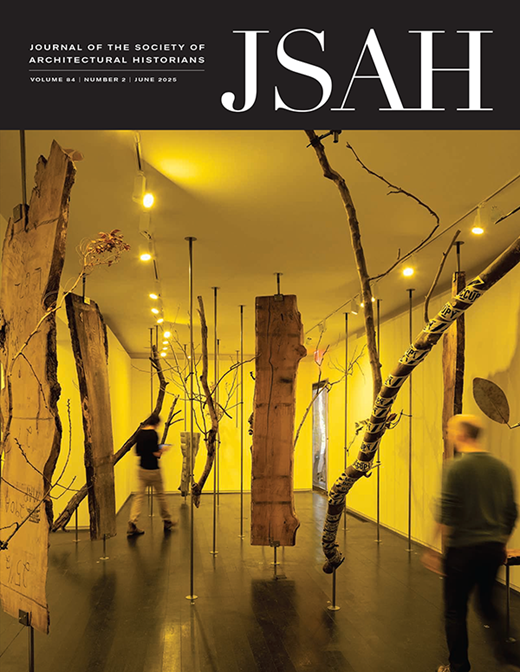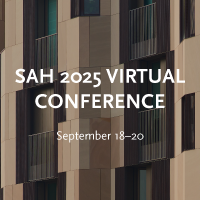-
Membership
Membership
Anyone with an interest in the history of the built environment is welcome to join the Society of Architectural Historians -
Conferences
Conferences
SAH Annual International Conferences bring members together for scholarly exchange and networking -
Publications
Publications
Through print and digital publications, SAH documents the history of the built environment and disseminates scholarshipLatest Issue:

-
Programs
Programs
SAH promotes meaningful engagement with the history of the built environment through its programsMember Programs
-
Jobs & Opportunities
Jobs & Opportunities
SAH provides resources, fellowships, and grants to help further your career and professional life -
Support
Support
We invite you to support the educational mission of SAH by making a gift, becoming a member, or volunteering -
About
About
SAH promotes the study, interpretation, and conservation of the built environment worldwide for the benefit of all
Reflection on This Year's Plenary by Cynthia Hammond
 This year's meeting in beautiful and resilient New Orleans was my first as a SAH member. In addition to an outstanding range of panels and presentations, Dr Craig Wilkins' plenary was a special privilege to hear. Presented in a spacious darkened theatre and unaccompanied by images, his address was a powerful reminder that architectural historians must continue to question the content of our classes, the decisions we make as researchers, and the scholarly priorities to which we dedicate our energies. His opening question was simple. "What if," he asked quietly, "You didn't matter?"
This year's meeting in beautiful and resilient New Orleans was my first as a SAH member. In addition to an outstanding range of panels and presentations, Dr Craig Wilkins' plenary was a special privilege to hear. Presented in a spacious darkened theatre and unaccompanied by images, his address was a powerful reminder that architectural historians must continue to question the content of our classes, the decisions we make as researchers, and the scholarly priorities to which we dedicate our energies. His opening question was simple. "What if," he asked quietly, "You didn't matter?"
Wilkins used wit and critical insight in equal measure to draw the audience into his primary concern, that architectural history - the books published year to year, the grants awarded, conference papers presented - often reiterates rather than steps beyond the familiar outlines of the architectural canon. If one does not belong to the cultural traditions that are produced or are represented within the canon, the implication is that one's own cultural traditions and production do not matter. This is a devastating message for young architects and scholars who may not fit cultural - and I would add, gendered - tropes within these professions.
At Concordia University in Montreal, where I teach courses in architectural history and art historical methodology, cultural diversity is one of our institution's most frequently touted attributes. And this diversity is indeed something that makes Concordia - and Montreal - wonderful. Yet I need not to reflect for long on the constitution of our classes in Art History to see that the majority of our students are white, English-speaking, middle-class women - like myself. The presence of female faculty in our Department is a testament to increasing gender inclusivity in Canadian institutions, which is something to celebrate. But Dr Wilkins' talk was a timely reminder that this advance is the thin edge of the wedge.
Wilkins' plenary recalled the observations of cultural critic, Bell Hooks, who has often pointed out that the objects studied in the Humanities rarely reflect the diversity we want to see in our classrooms. So what is taught - still the Western tradition, despite a lot of critical questioning - has a direct relationship to the constituency that registers for our courses. Wilkins reminded me that if I want change, as an educator I have to reflect the great scope of what matters beyond the history of privileged, European and European-descended producers of culture. The 2011 plenary was an elegant and moving call to action, whose key question came at the perfect moment - just as the precious summer months of research, writing and course planning beckon.
Cynthia Hammond
Concordia University, Montreal


Leave a commentOrder by
Newest on top Oldest on top